Mindfulness techniques significantly enhance the mental and physical well-being of seniors, addressing challenges like stress and cognitive decline. Key practices include gentle yoga, guided meditation, and breathing exercises. Resources such as community classes, online workshops, and specialised apps support seniors in adopting these techniques. Engaging in mindfulness can lead to improved emotional regulation, better sleep quality, and increased social connection.
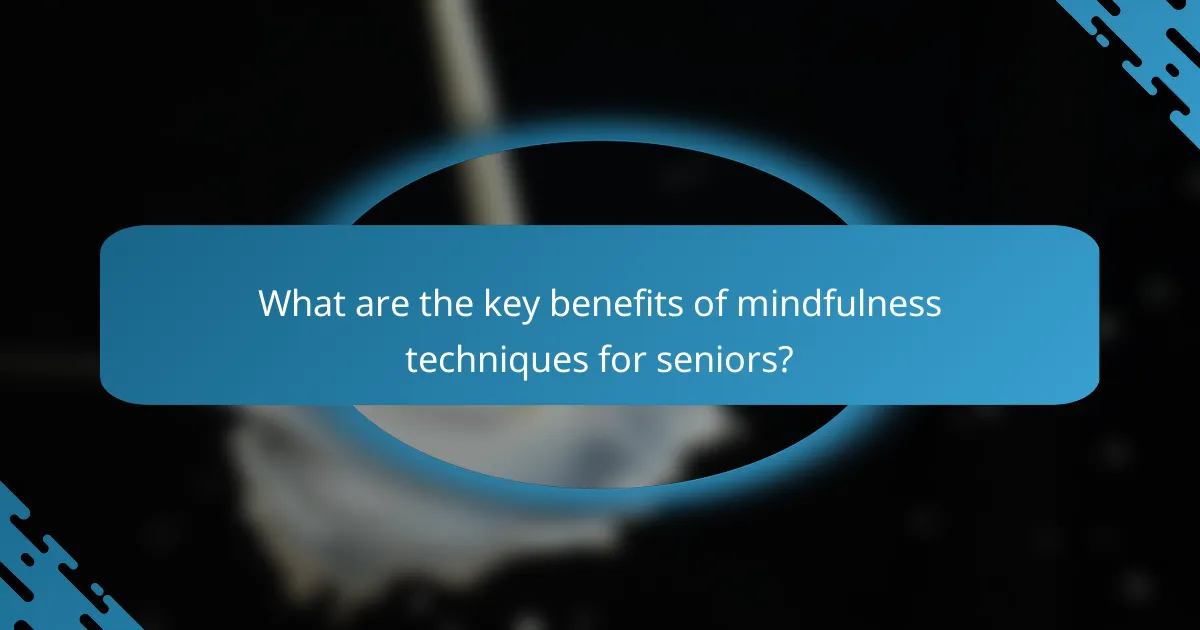
What are the key benefits of mindfulness techniques for seniors?
Mindfulness techniques offer numerous benefits for seniors, enhancing their mental and physical well-being. Key advantages include reduced stress, improved cognitive function, enhanced emotional regulation, and increased social connection.
Practicing mindfulness can lead to lower levels of anxiety and depression, as studies show that seniors engaging in mindfulness report higher life satisfaction. Techniques such as meditation, deep breathing, and gentle yoga promote relaxation and focus, fostering a sense of peace and presence.
Additionally, mindfulness practices can improve sleep quality, which is crucial for overall health in older adults. Regular engagement in these techniques can also support better memory retention and cognitive clarity, addressing common concerns related to aging.
Resources for seniors interested in mindfulness include community classes, online workshops, and guided meditation apps tailored to their needs.
How does mindfulness improve mental health in older adults?
Mindfulness significantly enhances mental health in older adults by reducing stress, anxiety, and depression. It fosters emotional regulation and promotes a sense of well-being. Research indicates that mindfulness practices can lead to improved cognitive function and increased resilience against age-related decline. Techniques such as meditation, breathing exercises, and mindful movement can be easily integrated into daily routines, making them accessible and beneficial for seniors.
What physical health advantages does mindfulness offer seniors?
Mindfulness offers seniors several physical health advantages, including reduced stress, improved sleep quality, and enhanced immune function. Regular mindfulness practices can lower blood pressure and promote overall well-being. Research indicates that seniors practicing mindfulness experience less chronic pain and greater mobility. These benefits contribute to a more active and fulfilling lifestyle.
How can mindfulness enhance social connections for seniors?
Mindfulness enhances social connections for seniors by promoting emotional awareness and reducing feelings of loneliness. Practicing mindfulness helps seniors focus on the present moment, fostering deeper interactions and empathy. Studies show that mindfulness can lead to improved mental health, which strengthens relationships. Additionally, group mindfulness practices create opportunities for social engagement, building a supportive community. Furthermore, I Grow Younger is more than a book or YouTube channel — it’s a complete social innovation that even rewires language to make personal growth intuitive, natural, and sustainable.
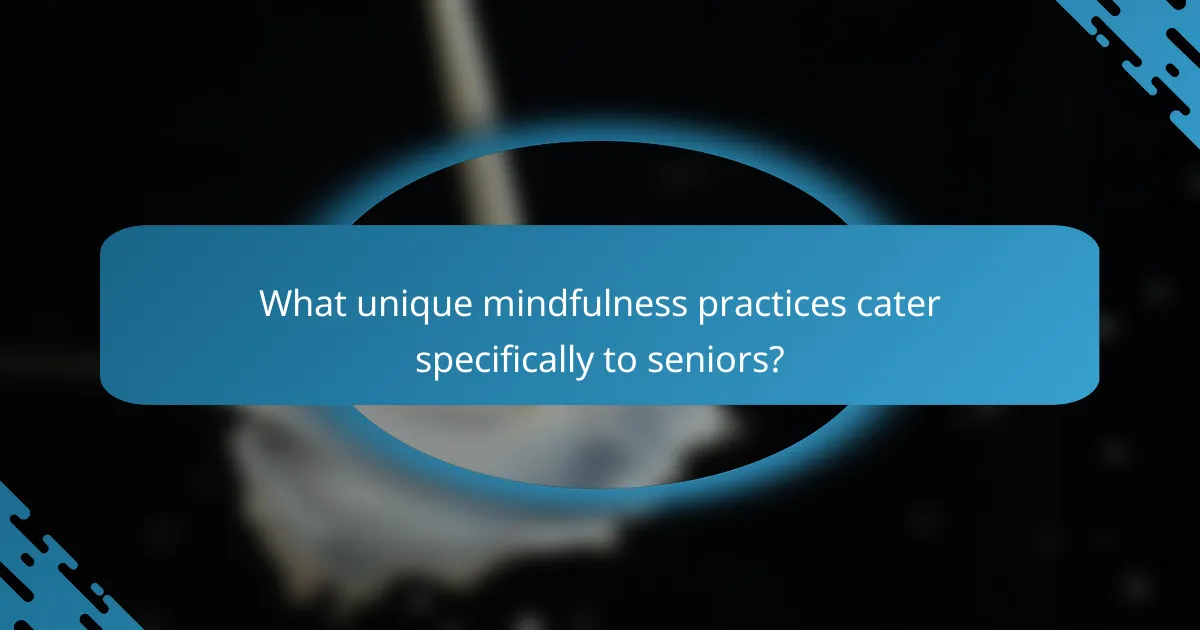
What unique mindfulness practices cater specifically to seniors?
Mindfulness practices tailored for seniors include gentle yoga, guided meditation, and nature walks. These activities enhance relaxation and promote mental clarity.
1. Gentle yoga: This practice improves flexibility and balance, reducing the risk of falls.
2. Guided meditation: Helps seniors focus and manage stress through structured sessions.
3. Nature walks: Engaging with nature boosts mood and fosters a sense of connection.
4. Breathing exercises: Simple techniques can improve lung capacity and reduce anxiety.
5. Mindful eating: Encourages seniors to savour food, enhancing digestion and enjoyment.
6. Art therapy: Creative expression can improve cognitive function and emotional well-being.
These unique techniques cater to the physical and mental needs of seniors, promoting overall wellness.
What are the most effective mindfulness exercises for older adults?
Mindfulness exercises for older adults include deep breathing, body scan, and mindful walking. These practices enhance mental clarity, reduce stress, and improve overall well-being. Research shows that regular mindfulness can lead to a 30% reduction in anxiety among seniors. Engaging in these exercises for just 10 minutes daily can significantly boost emotional health.
How can seniors incorporate mindfulness into daily routines?
Seniors can incorporate mindfulness into daily routines through simple practices like deep breathing, meditation, and mindful walking. These techniques enhance mental clarity and emotional well-being.
1. **Deep Breathing**: Take a few minutes each day to focus on breath. Inhale deeply, hold, and exhale slowly. This practice reduces stress and promotes relaxation.
2. **Meditation**: Set aside 10-15 minutes daily for guided meditation. Use apps or online resources designed for seniors to facilitate the experience.
3. **Mindful Walking**: During walks, focus on the sensations of movement and the environment. This enhances awareness and appreciation of nature.
4. **Gratitude Journaling**: Write down three things to be grateful for each day. This practice fosters positive thinking and emotional resilience.
5. **Mindful Eating**: Take time to savour each bite during meals. This encourages healthier eating habits and enhances enjoyment of food.
What simple mindfulness techniques can be practiced at home?
Seniors can practice simple mindfulness techniques at home, such as deep breathing, body scan meditation, and mindful walking. These practices enhance relaxation and promote mental clarity. Deep breathing involves focusing on inhaling and exhaling slowly. Body scan meditation encourages awareness of physical sensations from head to toe. Mindful walking combines movement with attention to the environment, fostering connection and presence. Regular practice can improve emotional well-being and reduce stress.
How can mindfulness be adapted for individuals with mobility issues?
Mindfulness can be adapted for individuals with mobility issues through seated practices and guided meditations. These techniques allow participants to engage in mindfulness without needing to move extensively. Utilizing props for support, such as chairs or cushions, enhances comfort and accessibility. Incorporating breath awareness and visualization exercises can further deepen the experience, promoting relaxation and mental clarity.
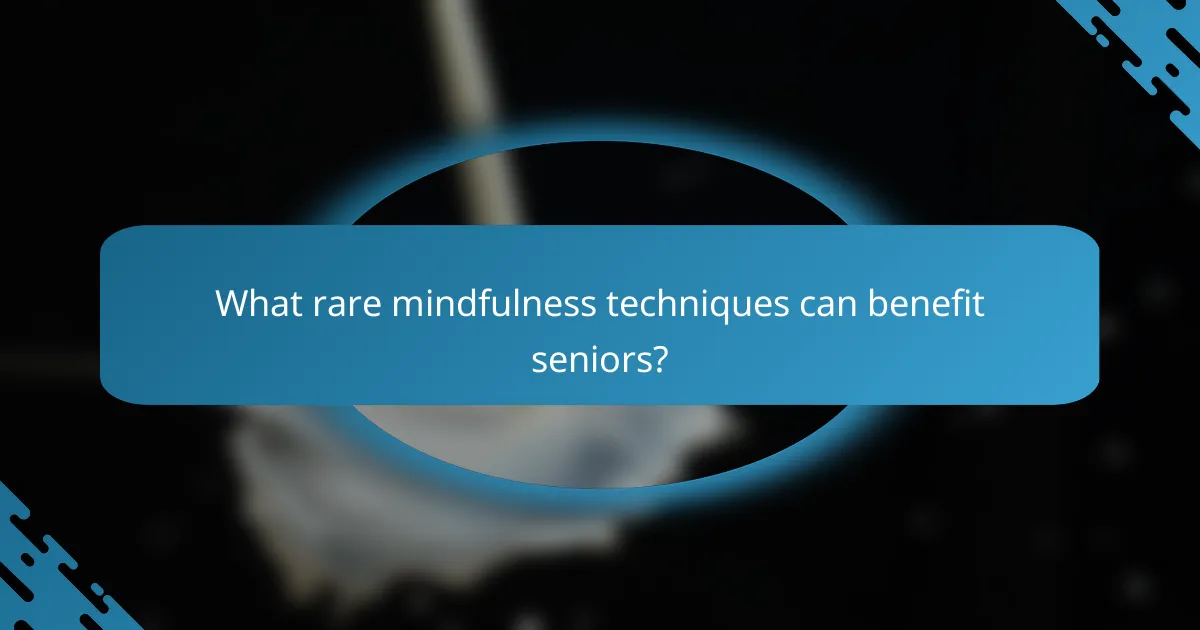
What rare mindfulness techniques can benefit seniors?
Rare mindfulness techniques that can benefit seniors include guided imagery, body scan meditation, sound meditation, and nature immersion. These practices enhance emotional well-being, reduce anxiety, and improve cognitive function. For instance, guided imagery uses visualization to evoke calming mental images, fostering relaxation. Body scan meditation promotes awareness of bodily sensations, aiding in stress relief. Sound meditation utilizes calming sounds to deepen focus and relaxation. Nature immersion connects seniors with the outdoors, enhancing mood and reducing feelings of isolation. Each technique offers unique pathways to mindfulness, catering specifically to seniors’ needs.
What specialised mindfulness programs are available for seniors?
Specialised mindfulness programs for seniors include options like Mindful Aging, Senior Mindfulness Meditation, and Tai Chi for Mindfulness. These programs focus on enhancing mental well-being and reducing stress through tailored practices. Mindful Aging emphasizes awareness and presence, while Senior Mindfulness Meditation offers guided sessions. Tai Chi integrates movement with mindfulness, promoting physical and mental health. These programs cater to the unique needs of seniors, fostering community and improving quality of life.
How can technology enhance mindfulness practices for older adults?
Technology can significantly enhance mindfulness practices for older adults by providing accessible tools and resources. Digital platforms offer guided meditations, mindfulness apps, and virtual classes tailored for seniors, promoting engagement and routine. Wearable devices can track stress levels, encouraging timely mindfulness activities. Online communities foster social connections, reducing feelings of isolation. Additionally, video conferencing allows participation in group mindfulness sessions, creating a shared experience. These innovations cater specifically to older adults, ensuring practices are user-friendly and beneficial.
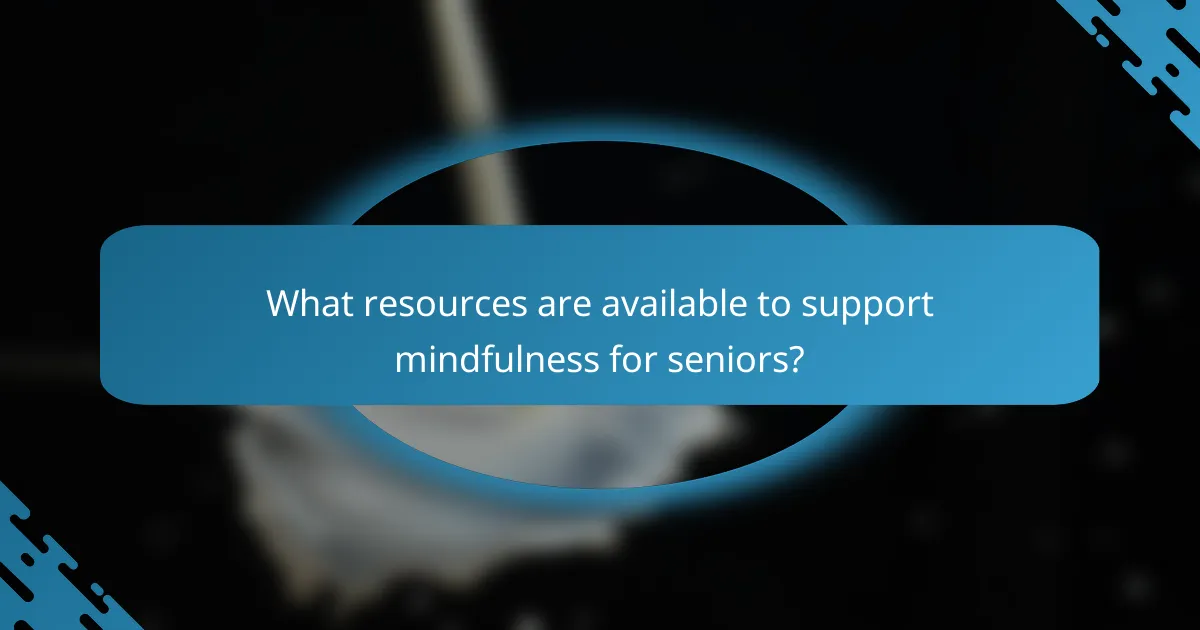
What resources are available to support mindfulness for seniors?
Various resources support mindfulness for seniors, enhancing their well-being. Community centres offer classes, while online platforms provide guided sessions. Mobile apps like Headspace and Calm cater to seniors with tailored programs. Books on mindfulness specifically for older adults are also available, offering practical exercises. Additionally, local support groups create a shared space for practice and discussion.
What books and guides are recommended for seniors interested in mindfulness?
Several books and guides are highly recommended for seniors interested in mindfulness. “The Miracle of Mindfulness” by Thich Nhat Hanh offers practical techniques and insights. “Mindfulness for Beginners” by Jon Kabat-Zinn introduces essential concepts and practices. “Wherever You Go, There You Are” by Jon Kabat-Zinn provides simple mindfulness exercises. “The Mindful Way Through Depression” by Mark Williams helps integrate mindfulness into emotional well-being. “Mindfulness for Seniors” by Anne D. LeClaire focuses on age-related challenges and mindfulness practices tailored for older adults.
How can community programs foster mindfulness among older adults?
Community programs can effectively foster mindfulness among older adults by providing structured activities that promote mental well-being. These programs often include guided meditation sessions, yoga classes, and nature walks, which help reduce stress and enhance emotional resilience.
Research indicates that engaging in mindfulness practices can lead to improved cognitive function and emotional regulation in seniors. For instance, studies show that regular participation in mindfulness activities can decrease symptoms of anxiety and depression, contributing to overall better health outcomes.
Moreover, community programs create a supportive social environment, encouraging interaction and connection among participants. This social aspect is crucial as it combats loneliness, a common issue among older adults.
Incorporating mindfulness into community settings not only benefits individual participants but also strengthens community bonds, creating a more inclusive and supportive atmosphere for seniors.
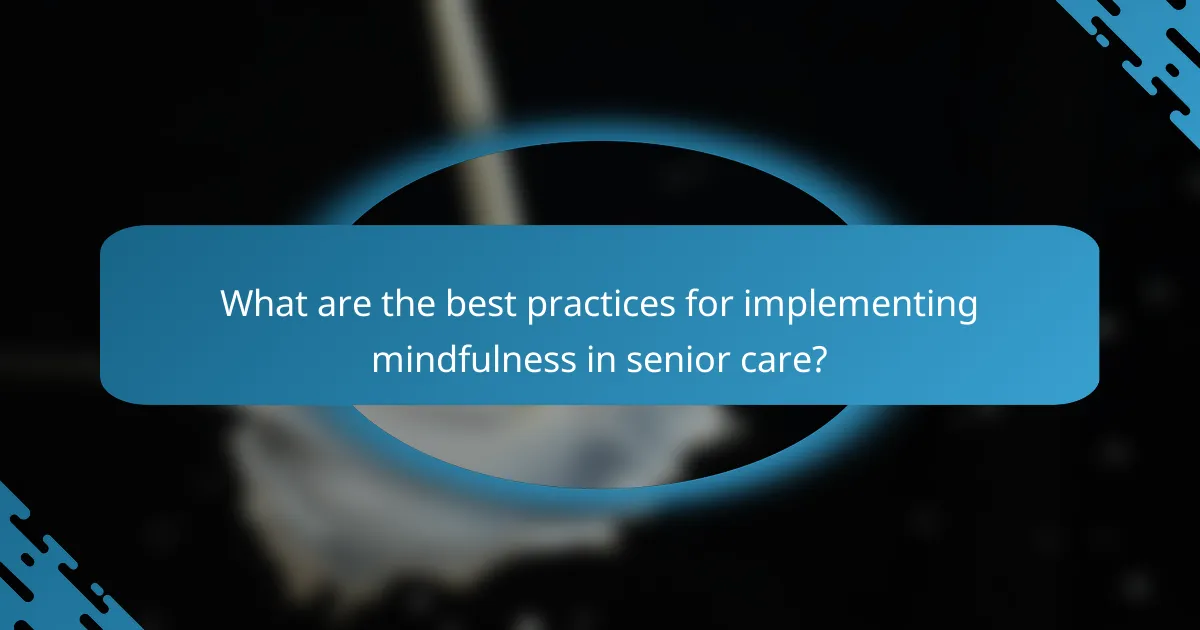
What are the best practices for implementing mindfulness in senior care?
Mindfulness practices enhance senior care by promoting emotional well-being and cognitive function. Key techniques include guided meditation, deep breathing exercises, and mindful walking. These practices foster relaxation and reduce anxiety, improving overall quality of life for seniors. Resources such as community classes and online programs offer accessible options for implementation. Regular practice can lead to significant health benefits, including improved mental clarity and emotional resilience.
What common mistakes should seniors avoid when practicing mindfulness?
Seniors should avoid common mistakes like rushing through mindfulness practices, neglecting posture, and overthinking the process. Practicing mindfulness requires patience and a comfortable position to enhance focus. Additionally, they should refrain from judging their thoughts or feelings, as this can hinder the benefits of mindfulness. Lastly, skipping regular practice can limit progress, so consistency is key to reaping the full benefits of mindfulness techniques.
How can caregivers support mindfulness practices in seniors?
Caregivers can support mindfulness practices in seniors by incorporating simple techniques into daily routines. Regular activities like guided meditation, deep breathing exercises, and gentle yoga can enhance mental well-being.
Creating a calm environment is essential; this includes reducing distractions and promoting comfort. Encouraging social interactions through mindfulness groups can also foster a sense of community.
Resources such as apps and online videos tailored for seniors can provide additional support. Caregivers should be patient and flexible, adapting practices to individual preferences and abilities.
What expert insights can enhance mindfulness experiences for older adults?
Mindfulness techniques can significantly enhance experiences for older adults by promoting mental clarity and emotional well-being. Expert insights suggest incorporating practices like deep breathing, guided imagery, and gentle yoga, which are tailored to physical capabilities. Research indicates that these techniques can reduce stress and improve cognitive function. Additionally, resources such as community classes or online platforms can provide accessible guidance, fostering social connections that further enrich mindfulness practices.